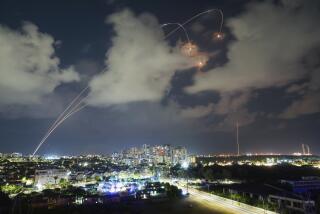Delay This One Indefinitely
- Share via
Defense Secretary William S. Cohen has decided to put off until next month his recommendation to President Clinton on whether to begin work on a national antimissile system. It would be better for the decision to be deferred indefinitely, because it’s clear that the technology for the projected $60-billion system remains unproven and the international political consequences of deployment have yet to be fully considered. Philip E. Coyle III, the Pentagon’s chief testing analyst, has expressed his concern about “undue pressure” to meet unrealistic deadlines for deploying the national missile defense (NMD) system. We take that to be a warning not to let election-year politics rush the timetable for the complex and costly project.
If Clinton gives the go-ahead for NMD, the Pentagon’s goal is to have it operational by 2005. But Cohen now concedes that delays in building a new three-stage rocket and other problems could thwart that plan. Early tests of the system have exposed serious flaws, even though the tests were set up to make interception of an incoming dummy warhead as easy as possible. Many of the nation’s leading physicists warn that far more serious technical problems lie ahead, including making sure that the interceptor “kill vehicle” can differentiate between a real warhead and decoys. Without that capability the system is all but useless.
NMD is intended to protect against attack by a small number of missiles from a country like North Korea, a possibility that assumes that Pyongyang--or Iran or Iraq--might someday embark on a course of national suicide. Recently, though, North Korean leader Kim Jong Il indicated to Russia’s President Vladimir V. Putin that Pyongyang might give up its intercontinental missile program if other countries would agree to pay for and launch its satellites. It’s not certain whether this is a serious proposal, but no harm could come from seeking elaboration.
A national missile defense system appears to offer security against irrational acts. But until it’s shown under realistic conditions that the many components of such a system work, security is only a hope. The technical feasibility of NMD remains unproven. That’s the best reason for proceeding warily on this dubious project.
More to Read
Sign up for Essential California
The most important California stories and recommendations in your inbox every morning.
You may occasionally receive promotional content from the Los Angeles Times.










